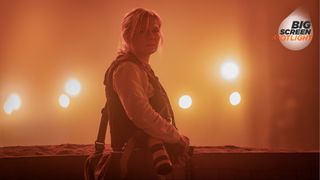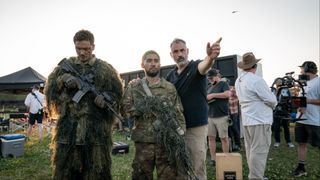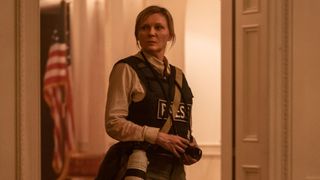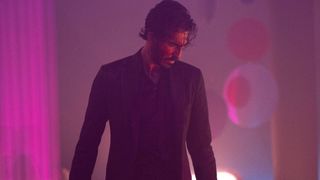Civil War's Alex Garland and Kirsten Dunst don't need to reassure audiences with their new action movie
Big Screen Spotlight | Civil War writer-director Alex Garland and star Kirsten Dunst talk us through politics, violence, and journalism

In Civil War, the latest movie from Ex Machina and Annihilation director Alex Garland, we see the horrors of conflict through camera lenses rather than crosshairs. Our way into the action is through seasoned photojournalist Lee (Kirsten Dunst), her Reuters colleague Joel (Narcos' Wagner Moura), and New York Times veteran Sammy (Dune's Stephen McKinley Henderson). There's also wannabe war photographer Jessie (Priscilla's Cailee Spaeny), who tags along for the ride to Washington DC to capture the last days of the President (Nick Offerman) before rebel forces take the White House.
According to Dunst, the movie's focus on the press rather than civilians or the armed forces is "really based on the way Alex grew up. His father was a cartoonist for a newspaper and he grew up with journalists around him, so I think that way in was the most natural way for Alex," she tells GamesRadar+. "I think it makes it more about humanity. Instead of having a gun, you have your camera. That's a very different way in and I think there's a beauty to that kind of work as well."
And cameras do literally bring us into the film – when Lee or Jessie takes a photo, we see the shot, briefly, a starkly composed still momentarily filling the screen in the midst of the chaos. The stasis should act as a reprieve from the brutal action, but it doesn't. The lack of movement only makes the horror more stark.
Silence and noise

This starkness is prevalent throughout the movie: the action scenes in Civil War are unsettling in their simplicity. One thing that stands out is the silence after gunshots or explosions in favor of the 'ringing-in-your-ears' sound effect so often employed in war films. "We used the language of reality, so it came either from lived experience or it came from news footage or documentaries," Garland explains to us.
"A simple example might be that film has grammar to do with the way people get shot. There's big clouds of blood and they fly back, [but] quite a lot of time when someone is shot all they do is fall down and there's nothing very dramatic about it. Now, somebody watching the film may or may not ever have seen someone get shot in real life or on news footage or whatever. But even if they've never seen it, they pick up on a funny kind of accent towards reality. And so when they see moments of violence, it will have something that feels true."
The first of these scenes occurs early in the film, when Lee and Jessie meet for the first time. A large crowd in the streets descends into civil unrest when a bomb explodes, and Lee comes to Jessie's assistance when she sees the younger woman with her camera but without a press vest or any protective equipment. The sound design, lurching from overwhelming cacophony to unnerving silence, and the kinetic, suffocating visuals of the crush make this the first of Civil War's many terrifying action sequences.
Shining a light on the under-the-radar theatrical releases that you need to know about, with a new article every Friday
"What cinema does when it does things that aren't true is it makes people feel more comfortable," Garland continues. "Like, this is a really scary alien that's ripping people to pieces, but none of that is anything I ever really have to worry about. Whereas you as an individual could get caught up in a bit of violence on the street where people are pounding the hell out of each other. And you could suddenly find yourself in the middle of it, that could happen. So, it lands differently on you."
Sign up to the GamesRadar+ Newsletter
Weekly digests, tales from the communities you love, and more
In that scene and many others throughout the film, Lee moves through the carnage with her camera as if on autopilot. There's a disconnect there, a removal from the situation that stems from self-preservation and a hardened disengagement that's the result of so many years in the field. Disengagement, however, is also something that some critics have claimed lies at the heart of the film.
Open to interpretation

Civil War has divided critics in one key area: its politics. While the President's tyranny is indisputable (he's disbanded the FBI and is currently in his third term in the Oval Office), the movie avoids getting under the skin of its characters' beliefs, whether that's Lee and her fellow journalists or some of the more extreme figures they meet on the road. "Civil War offers a lot of food for thought on the surface, yet you’re never quite sure what you’re tasting or why, exactly," reads Rolling Stone's review, while Deadline writes that the film has "an overreliance on spectacle over substance".
It's a critique that Garland vehemently refutes, though. "I'm interested by people thinking things are opaque," he says. "It's not that they're opaque, it's just the film is not telling you. The film is requiring you to step into it in order to see those things. It's about the viewer being a participant and that is how I always make films.
"It's not that I think that is the right way to make a film or the right way to tell a story. There are many films out there that tell you everything clearly and go out of their way to be super clear, so nobody can be in doubt about the function of the film, the intentions of the filmmakers, all that sort of stuff, and they function as a reassurance. But that's not really what I'm interested in. I do think clarity exists within [Civil War], it's just a two-way clarity and involves both people participating."

Dev Patel's new action movie Monkey Man is so much more than the next John Wick
But how does that "participation" translate into an actor's performance? "When I was reading the script, I didn't worry about [filling in the gaps]," Dunst says. "I thought, 'That's such a better way in'. You don't want to put your own impressions or political views onto a film like that, it kind of defeats the purpose of what this film is trying to give you."
For Dunst, it's down to the viewer's own interpretation. "I wasn't worried and filling in like, 'Well, what happened here? Why did Texas and California join together?'" she continues, speaking of the "Western Forces" mentioned in the movie. "Those are two very powerful states and if they're going up against a government that has thrown democracy out the window, it would make sense to me that those two would put their differences aside and join forces. But then it's really up to how you feel watching the film, which is cool that it leaves so much up to the audience member watching it."
Civil War is out now in cinemas. For more on what else you should be watching at the cinema, be sure to check out the rest of our Big Screen Spotlight series.
I’m an Entertainment Writer here at GamesRadar+, covering everything film and TV-related across the Total Film and SFX sections. I help bring you all the latest news and also the occasional feature too. I’ve previously written for publications like HuffPost and i-D after getting my NCTJ Diploma in Multimedia Journalism.
Most Popular




